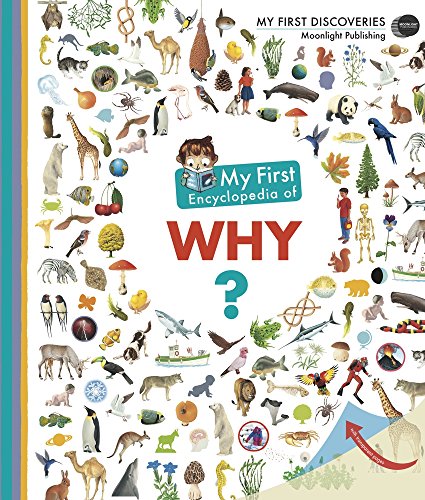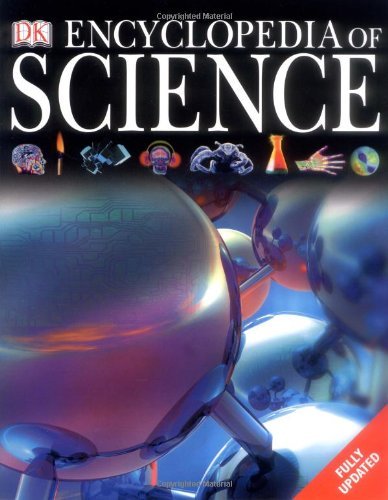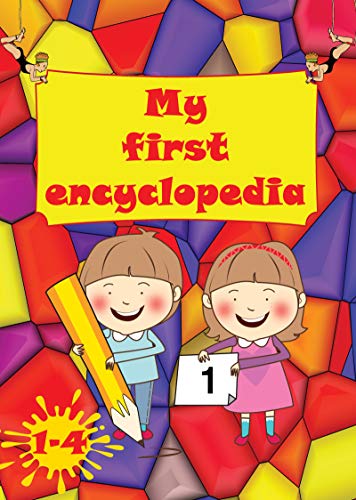-
My First Encyclopedia of Why?
Sophie Lamoureux
Spiral-bound (Moonlight Publishing, Nov. 1, 2016)Why is a storm noisy? Why do trees lose their leaves in autumn? Why are there mountains? Why do we have a belly button? What are flamingos pink? Why don’t boats sink? Why is seawater salty? This book provides clear answers to many questions that children ask, but also invites them to explore further and to ask many more questions. These clear and concise answers to 150 questions about animals, the human body, and the Earth and sky are accompanied by more than 200 detailed and lifelike illustrations that help children visualize and contextualize the answers. Many of the larger illustrations are labeled, enabling children to build their vocabulary, and there is a quiz at the end of the book. K
K
-
Encyclopedia of Science
DK
Paperback (Dorling Kindersley, March 15, 1832)Encyclopedia of Science (Dk Encyclopedia) by DK (2006-11-02)
-
Visual Encyclopedia of Science
DK Publishing
Paperback (DK CHILDREN, April 4, 2005)Space, matter, living creatures, and more are examined in a revised and comprehensive reference guide which is organized thematically to make science accessible and relevant to young readers. Original. X
X
-
Encyclopedia of Science
DK Publishing
Paperback (DK CHILDREN, Nov. 20, 2006)Revised to cover the latest research, this new edition of the DK Science Encyclopedia is an essential reference for today's students and young scientists. X
X
-
Science Encyclopedia
DK Publishing
Paperback (DK Children, June 16, 2003)Book by DK Y
Y
-
My First Encyclopedia
Parragon Publishing
Hardcover (Parragon Publishing, June 30, 2007)Book by Parragon Publishing
-
My First Encyclopedia
Smart Family
language (, July 29, 2018)Has your toddler begun to actively explore the world around them? Does your kid like colorful books with illustrations? Do you want to hear more new words from him or, perhaps, to hear his very first words? If your answer is yes to these questions, then this is exactly the book you need. "My First Encyclopedia" was created for the active development of children! It includes beautiful and interesting illustrations for children on the following topics: alphabet numbers figures colors vegetables fruits clothes This book was created in such a way that it will be interesting and useful even to the youngest children, as well as to those who are already studying the alphabet. View and study this book with your toddler for 10-15 minutes each day, and you will see how quickly his memory and attention will develop! (8.5 x 11 inches), 40 Color pages, Cover glossy
-
First Space Encyclopedia
-DK
Paperback (DORLING KINDERSLEY CHILDREN'S, June 1, 2016)First-Space-Encyclopedia
-
Visual Encyclopedia of Science
Brian Williams, Neil Curtis, James Muirden
Hardcover (Kingfisher Books, Aug. 1, 1994)A thorough overview provides thousands of scientific facts divided into four distinct subject areas--The Living World, The Planet Earth, Stars and Planets, and Science and Technology--and includes colorful charts, diagrams, and illustrations. X
X
-
First Science Encyclopedia
Philippa Moyle, Kate Scarborough, Teresa Foster
Hardcover (Smithmark Pub, July 1, 1997)Moyle, Philippa, Scarborough, Kate
-
My First Encyclopedia
Editors of Kingfisher
Paperback (Kingfisher, July 19, 2011)In the Kingfisher First Encyclopedia, children can easily study more than 100 popular topics using the alphabetically arranged entries. Information is presented in clearly written text with vocabulary appropriate for young readers. Cross-reference boxes link related entries, and children will enjoy using them to find their favorite topics throughout the book. Exciting color illustrations and photographs aid understanding and fill each page with interest. L
L
-
UXL Encyclopedia of Science
Rob Nagel
Hardcover (UXL, Sept. 21, 2001)Includes 600 topics in the life, earth, and physical sciences as well as in engineering, technology, math, environmental science, and psychology. W
W